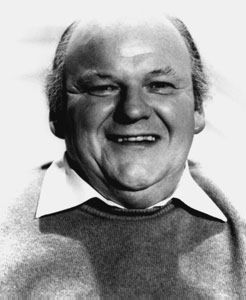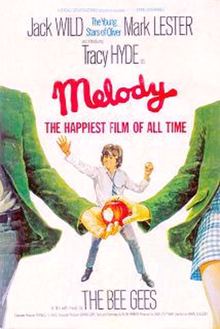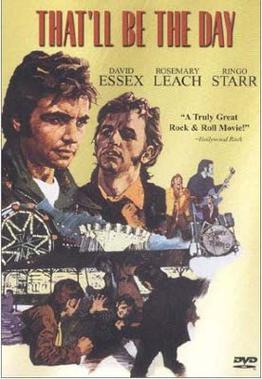Glam rock is a style of rock music that developed in the United Kingdom in the early 1970s and was performed by musicians who wore outrageous costumes, makeup, and hairstyles, particularly platform shoes and glitter. Glam artists drew on diverse sources across music and throwaway pop culture, ranging from bubblegum pop and 1950s rock and roll to cabaret, science fiction, and complex art rock. The flamboyant clothing and visual styles of performers were often camp or androgynous, and have been described as playing with other gender roles. Glitter rock was a more extreme version of glam rock.

Henry Kenneth Alfred Russell was a British film director, known for his pioneering work in television and film and for his flamboyant and controversial style. His films were mainly liberal adaptations of existing texts, or biographies, notably of composers of the Romantic era. Russell began directing for the BBC, where he made creative adaptations of composers' lives which were unusual for the time. He also directed many feature films independently and for studios.

David Essex is an English singer, songwriter, and actor. Since the 1970s, he has attained 19 Top 40 singles in the UK and 16 Top 40 albums. Internationally, Essex had the most success with his 1973 single "Rock On". He has also had an extensive career as an actor.

Sir Alan William Parker was an English filmmaker. His early career, beginning in his late teens, was spent as a copywriter and director of television advertisements. After about ten years of filming adverts, many of which won awards for creativity, he began screenwriting and directing films.

David Terence Puttnam, Baron Puttnam, CBE, HonFRSA, HonFRPS, MRIA is a British-Irish film producer, educator, environmentalist and former member of the House of Lords. His productions include Chariots of Fire, which won the Academy Award for Best Picture, The Mission, The Killing Fields, Local Hero, Midnight Express and Memphis Belle. In 1982, he received the BAFTA for Outstanding British Contribution to Cinema, and in 2006 he was awarded the BAFTA Fellowship for lifetime achievement from the British Academy of Film and Television Arts.

Roy Mitchell Kinnear was an English character actor and comedian. He was known for his acting roles in movies such as Henry Salt in the 1971 film Willy Wonka & the Chocolate Factory, Algernon in The Beatles' Help! (1965), Clapper in How I Won the War (1967), and Planchet in The Three Musketeers (1973). He reprised the role of Planchet in the 1974 and 1989 sequels, and died following an accident during filming of the latter.

Andrew Matthew William Faulds was a British actor and Labour Party politician. After a successful acting career on stage, on radio and in films, he was a Member of Parliament from 1966 to 1997.
In addition to the Beatles' films A Hard Day's Night (1964), Help! (1965), Magical Mystery Tour (1967), Yellow Submarine (1968) and Let It Be (1970), Ringo Starr also acted in films such as Candy (1968), The Magic Christian, Blindman (1971), Son of Dracula (1974) and Caveman (1981). Starr directed and appeared in Born to Boogie (1972), a concert film featuring Marc Bolan and T. Rex. For the 1979 documentary film on the Who, The Kids Are Alright, Starr appeared in interview segments with fellow drummer Keith Moon. He starred as Larry the Dwarf in Frank Zappa's 200 Motels (1971). His voice is also featured in Harry Nilsson's animated film The Point! (1971).

Kenneth Colley is an English film and television actor whose career spans over 60 years. He came to wider prominence through his role as Admiral Piett in the Star Wars films The Empire Strikes Back (1980) and Return of the Jedi (1983).

Melody (originally titled S.W.A.L.K. is a 1971 British children's romantic comedy-drama film directed by Waris Hussein about puppy love. The film starred Jack Wild, Mark Lester and Tracy Hyde.
Nat Cohen was a British film producer and executive. For over four decades he was one of the most significant figures in the British film industry, particularly in his capacity as head of Anglo-Amalgamated and EMI Films; he helped finance the first Carry On movies and early work of filmmakers such as Ken Loach, John Schlesinger, Alan Parker and David Puttnam. In the early 1970s while head of EMI Films he was called the most powerful man in the British film industry. He's been called "an unsung giant of British film who never got his due from the establishment in part because of anti-Semitism... the ability to be a successful studio head is very rare and most only last a few years. Cohen did it successfully at various companies for over two decades."

Lisztomania is a 1975 British surreal biographical musical comedy film written and directed by Ken Russell about the 19th-century composer Franz Liszt. The screenplay is derived, in part, from the book Nélida by Marie d'Agoult (1848), about her affair with Liszt.
Lee Montague is an English actor noted for his roles in film and television, usually playing tough guys.

That'll Be the Day is a 1973 British coming of age drama film directed by Claude Whatham, written by Ray Connolly, and starring David Essex, Rosemary Leach and Ringo Starr. Set primarily in the late 1950s and early 1960s, it tells the story of Jim MacLaine (Essex), a British teenager raised by his single mother (Leach). Jim rejects society's conventions and pursues a hedonistic and sexually loose lifestyle, harming others and damaging his close relationships. The cast also featured several prominent musicians who lived through the era portrayed, including Starr, Billy Fury, Keith Moon and John Hawken. The film's success led to a sequel, Stardust, that followed the life of Jim MacLaine through the 1960s and 1970s.

Stardust is a 1974 British musical drama film directed by Michael Apted and starring David Essex, Adam Faith, and Larry Hagman. It is the sequel to the 1973 film That'll Be the Day, which introduced the characters of Jim MacLaine and his street-smart friend Mike Menary. It chronicles Jim's rise and fall as an international rock star during the 1960s and early 1970s, with Mike as his personal manager. It features a number of pop/rock performers, including Essex, Faith, Keith Moon, Marty Wilde, Dave Edmunds, Paul Nicholas and Edd Byrnes.

Mahler is a 1974 British biographical film based on the life of Austro-Bohemian composer Gustav Mahler. It was written and directed by Ken Russell for Goodtimes Enterprises, and starred Robert Powell as Gustav Mahler and Georgina Hale as Alma Mahler. The film was entered into the 1974 Cannes Film Festival, where it won the Technical Grand Prize.
Sanford "Sandy" Lieberson is an American film producer and educator based in Britain since 1965.
Trick or Treat is an unfinished British film directed by Michael Apted that began production in 1975. It led to the breakup of the producing partnership between David Puttnam and Sandy Lieberson.

Valerie Lush was a British actress who appeared in many British television programmes. She is best known for playing Auntie Flo in ...And Mother Makes Three (1971–1973) and ...And Mother Makes Five (1974–1975).
Herbert Norville is an actor known for his appearances in many British films in the 1970s and '80s such as Scum (1979), Pressure (1976), Meantime (1983), Full Metal Jacket (1987) and Bugsy Malone (1976).












